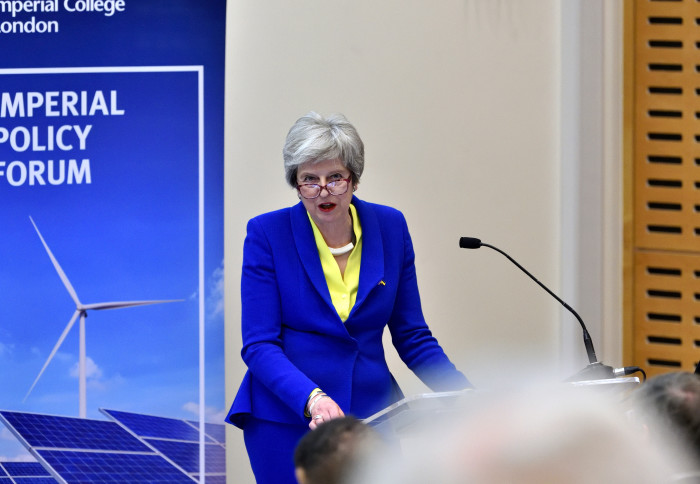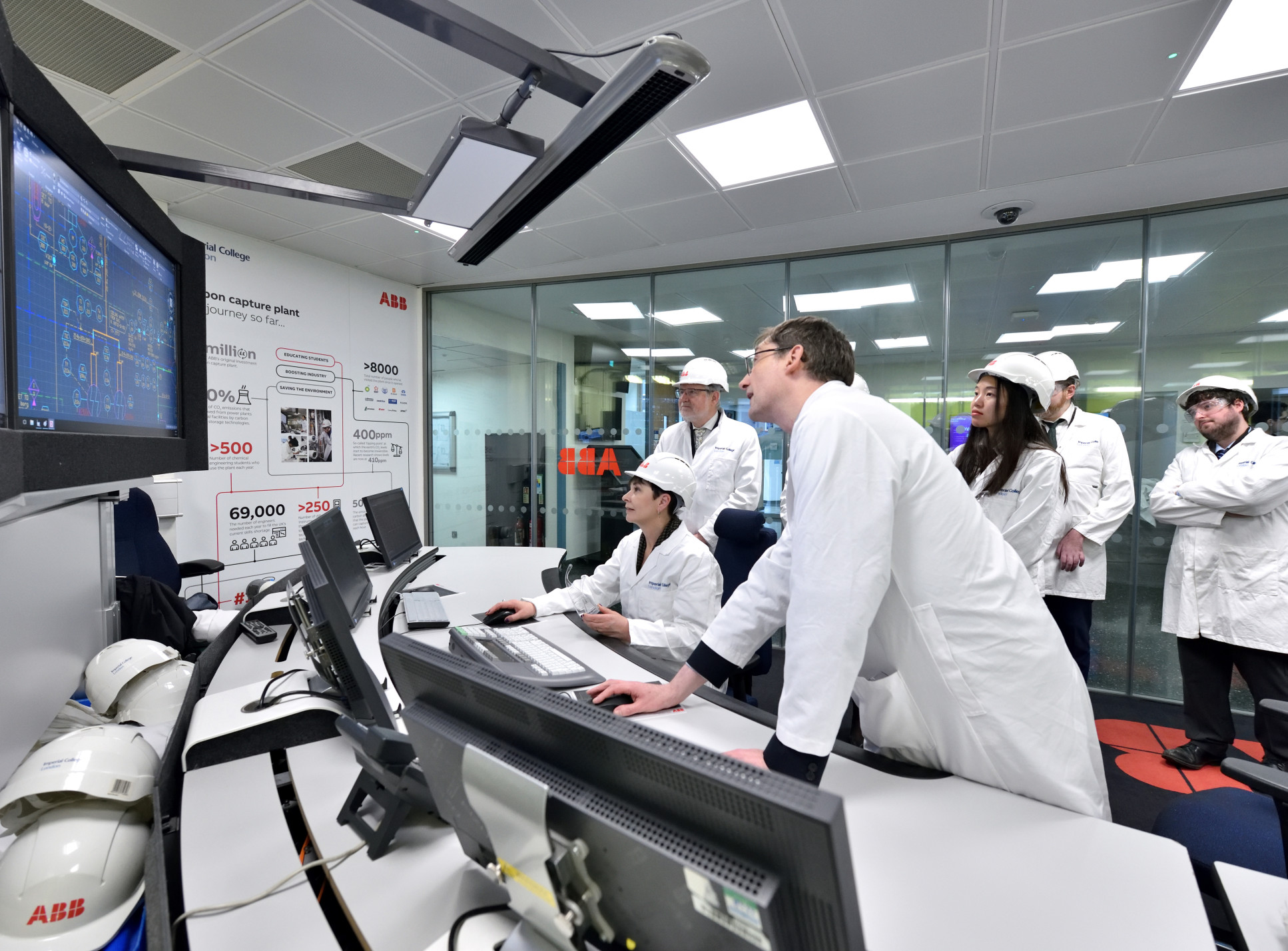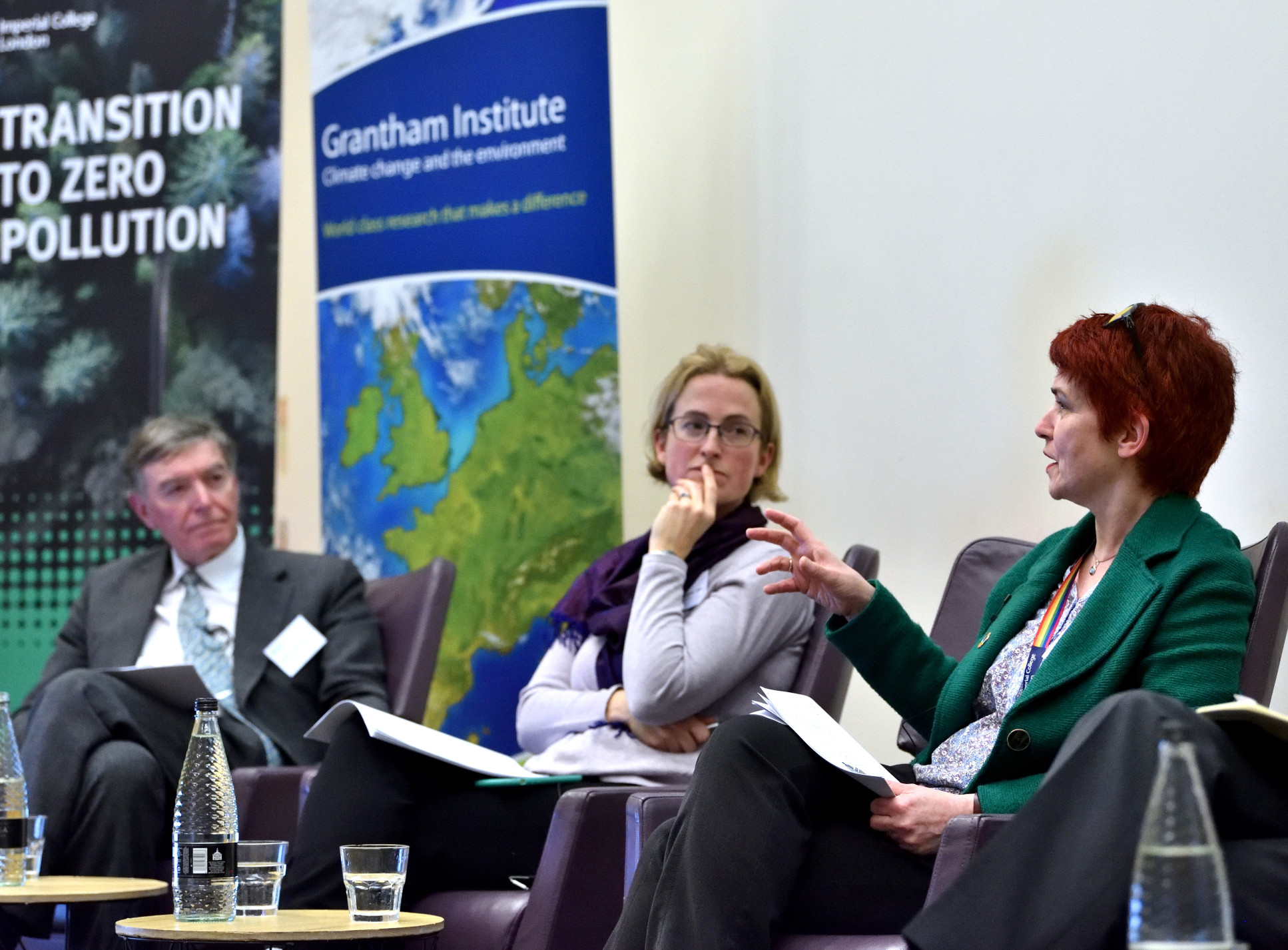Environmental Audit Committee celebrates 25th anniversary at Imperial College
by Pete Ford

Former Prime Minister, Theresa May MP
Imperial hosted former Prime Minister Theresa May and Environmental Audit Select Committee members to celebrate 25 years of Committee’s work.
The Environmental Audit Committee, a cross-party group of MPs established to examine environment and sustainable development policies across government, held its 25th anniversary celebration at Imperial College London. The event, organised by Imperial Policy Forum and the Grantham Institute – Climate Change and Environment, brought together policymakers, academics and experts voices from across environmental policy to consider the past work of the Committee and look ahead to the challenge of the future.
MPs meet Imperial academics
Committee members were welcomed to the college by Provost Professor Ian Walmsley before meeting academics and students while visiting facilities in the Department of Chemical Engineering.
Hosted by Professor Tim Green, Academic Sustainability Leader, Professor Omar Matar, Head of the Department of Chemical Engineering and Dr Colin Hale, Senior Teaching Fellow, members saw first-hand how Imperial provides students with the knowledge and skills to lead a Net Zero future. The Committee visited the Carbon Capture Pilot Plant, the only facility in the world where learn to operate an industry-like plant stretching over four floors.Imperial staff and students showed Committee members how to control the plant during an emergency and demonstrated best practice in capturing and storing carbon dioxide before it can be released into the atmosphere.
Members also saw Imperial’s world leading research into sustainable energy materials, particularly for battery applications essential to transition to clean energy. Members toured Professor Magda Titirici’s group laboratory learning about their work into replacement chemistries, like sodium, for lithium to develop more sustainable electric vehicle batteries. The Committee finished their tour by visiting Dr Qilei’s Song’s group laboratory and hearing about research and developments into batteries for large scale energy storage. Energy storage batteries will be essential to building an effective low carbon energy system that harness energy produced from sources such as offshore wind and solar. Dr Song was recently awarded an ERC Proof of Concept grant for their research into redox flow batteries for energy storage.
Anniversary Event
President Hugh Brady welcomed the Committee and guests to an event celebrating 25-years of scrutiny by the Committee. He spoke about the importance of Select Committees in scrutinising net zero policy and the increasing competitive global environment for net zero investment and innovation, referencing the United States’ Inflation Reduction Act and the European Union’s Green Deal Investment Plan.
celebrating 25-years of scrutiny by the Committee. He spoke about the importance of Select Committees in scrutinising net zero policy and the increasing competitive global environment for net zero investment and innovation, referencing the United States’ Inflation Reduction Act and the European Union’s Green Deal Investment Plan.
Committee Chair, Philip Dunne MP, reflected on the history of the Committee and successes in changing government policy before introducing former Prime Minister Theresa May to deliver a keynote on holding the government to account for its environmental policy.
In 2019, the UK became the first major economy to pass legislation requiring the reduction of greenhouse gas emission to net zero by 2050. As Prime Minister, Theresa May MP announced the historic plans at a visit to Imperial College in June 2019.
In her address, she advocated for collaborative working across Government to drive the policy for and scrutiny of environmental targets. She acknowledged that environmental targets, and the well-understood underlying case for the targets, are positive but that it is now time for the Government to focus on delivering policies to meet those targets.
Echoing remarks made by President Brady, she stated that it is the Government’s duty to set the investment incentives to attract cleantech - the technologies that reduce negative environmental impact - and environmentally positive investment into the UK to remain competitive and lead the global transition to net zero.
Future of environmental scrutiny
Philip Dunne MP then chaired a panel discussion looking ahead to the next 25 years of environmental scrutiny. Panellists included Professor Mary Ryan, Vice-Provost for Research and Enterprise at Imperial College London, Dr Hannah White, Director of the Institute for Government, Mary Creagh, chair of the Environmental Audit Committee between 2016 and 2019, and David Shukman, former science editor of BBC News. The panel discussed future challenges in climate and environmental policy including adaption, supporting innovation and new technologies and engaging the public with climate and environment friendly choices.

“It was great to host the Committee’s anniversary at Imperial and be part of such a wide-ranging event and panel. The panel reinforced the importance of environment scrutiny, the challenges we face to tackle the climate and biodiversity crises and the critical role research and innovation driven by universities, like Imperial, will play in reaching a healthier, zero pollution future” Professor Mary Ryan Vice-Provost (Research and Enterprise), Imperial College London
The Committee then invited pitches from three academics for a future topic for the Committee to launch an inquiry, taking written and oral evidence before submitting a report with recommendations to government, into. In recent years the Committee has held inquiries into areas as diverse as plastics, fast fashion, net zero finance and nature restoration.
After an open call for submissions three academics were selected by the Committee to pitch their ideas in three minutes each. Each pitch was followed by 5-minutes of questions from Committee members, Clive Lewis MP, Labour MP for Norwich South, Dr Caroline Lucas MP, Green Party MP for Brighton Pavilion, John McNally, Scottish National Party MP for Falkirk, and Chris Skidmore MP, author of the recent Mission Zero: Independent Review into Net Zero and Conservative MP for Kingswood.
Imperial academic Dr Stephanie Wright, a Lecturer at the Medical Research Council Centre for Environment and Health, pitched an inquiry into a ‘one health approach to microplastic solution’. She was joined by Mark Charlton from DeMontford University who pitched an inquiry into the role of local sports clubs in reaching net zero and Dr Nicole Miranda from Oxford’s Martin School who suggested an inquiry into ‘the need for a heat resilience strategy’.
Imperial pitcher, Stephanie Wright said:
'It was an honour to represent the College and pitch to such an esteemed panel, in what was a celebratory yet contemplative event with environmental health at the heart.'
Imperial is a world-leader in climate change and environmental research, driving advances in sustainable energy sources, electric vehicles, and fuel cells; tackling water scarcity and ocean plastics; improving air quality; and helping to ensure food security and climate resilience across the world. The College’s Transition to Zero Pollution initiative takes a systems approach to consider pollution in all its forms, not just zero carbon.
You can watch a video about the event here.
Article text (excluding photos or graphics) © Imperial College London.
Photos and graphics subject to third party copyright used with permission or © Imperial College London.
Reporter
Pete Ford
College Headquarters